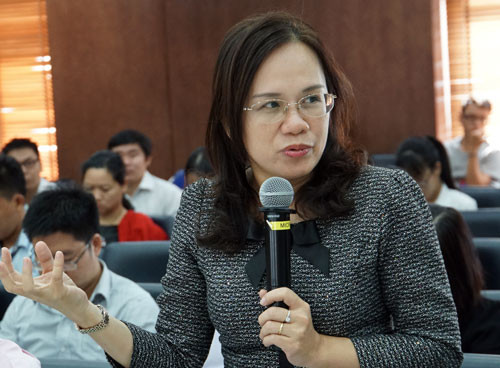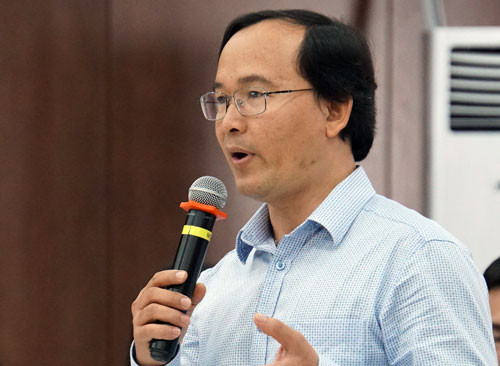“Parents Association” proposed to be removed from the revised Education Law
Whether or not there is a parent-teacher association is voluntary and should not be under the management of the Ministry of Education.
|
Dr. Thai Thi Tuyet Dung. Photo:Manh Tung |
January 16, comments on regulations on autonomy and state management indraftEducation Law(amended), Dr. Thai Thi Tuyet Dung (Head of Administrative Law, Ho Chi Minh City University of Law) said that the regulation on "issuing regulations on the board of parents' representatives" in Clause 2, Article 102 should be removed. Because private educational institutions currently do not have a board of parents' representatives and still operate normally. Whether or not there is a board of representatives is voluntary and should not be under the management of the Ministry of Education.
"In the context of today's society developing information technology, communication between families and schools is very convenient, the parents' association should only be a voluntary organization," said Ms. Dung. In cases where it is mandatory to have a parent representative committee with the educational institution, it is necessary to clearly define whether or not there will be any consequences if it is not established.
Ms. Trinh Anh Nguyen (more than 10 years working in the parent association) shared that whether or not the representative board exists depends on whether the school is public or private. So if the board is seen to be active, they will contribute to building it and vice versa. "I agree that there are many shortcomings in the representative boards at many schools. If the board is not professional, I will not participate," Ms. Nguyen said and suggested that the parent association needs to be trained in skills of operation, speaking, and dealing with parents.
From the perspective of a manager, Mr. Nguyen Hung Khuong, Vice Principal of Bui Thi Xuan High School (HCMC) said that it is necessary to keep the regulation on the representative board in the draft law. If it is removed, it will be impossible to issue sub-law documents specifically regulating the operating regulations of this organization.
In fact, Mr. Khuong highly appreciated the role of the parent-teacher association. For this association to operate effectively and towards positive goals, there needs to be close coordination between parent representatives and the school.
Different from Ms. Tuyet Dung, Associate Professor Phan Nhat Thanh (Faculty of Administrative Law - State, Ho Chi Minh City University of Law) said that it is impossible to abolish the parent-student representative committee, because if education is socialized without a committee, who will do it? It is necessary to clarify their role to support this goal.
"We cannot accuse all representative boards of abusing their power to collect illegal fees. This board has a big role in coordinating with schools to find ways to provide students with a better learning environment," he said.
The issue of keeping or abolishing the parent-teacher association in high schools received special public attention at the beginning of the 2017-2018 school year, when a parent submitted a petition to the Ho Chi Minh City government and the education management agency requesting to "dissolve the Parent-Teacher Association".
|
Mr. Nguyen Hung Khuong gave his comments. Photo:Manh Tung |
At the workshop, delegates focused on discussingregulations on autonomy and state managementAssociate Professor Nguyen Van Van (Ho Chi Minh City University of Law) expressed his opinion that contrary to the concept of autonomy at the university level, finance, human resources - organization and professional expertise need to be limited at the high school level.
Talking about the concept of autonomy in education, developed countries often use the word "autonomy", originating from the idea of academic freedom. Meanwhile, in Vietnam, autonomy is only limited to finance. "We are using finance as the main axis to talk about autonomy, having money means having power, very pragmatic," he said frankly.
If at the university level, financial autonomy means autonomy in creating and using revenue sources, then at the high school level, it must be autonomy in distributing financial resources, not creating them. Giving the right to create revenue sources to the school will easily lead to overcharging.
Dr. Pham Thi Ly (Nguyen Tat Thanh University) commented that the current draft Law on Education contains positive and progressive points, including diversity, respect for differences, and encouragement of private investment. However, the current general education program is heavy because schools do not have the right to change it. On the one hand, they have to teach the general curriculum, and on the other hand, they have to teach the programs that parents and society need.
In addition, many delegates also suggested that it is necessary to add regulations to affirm that the Ministry, ministerial-level agencies and other agencies must be responsible for explaining the activities and quality of education at affiliated facilities within the assigned scope. In fact, the Ministry cannot control educational facilities that are not under the Ministry of Education in terms of organization, personnel and quality of education.
Some delegates proposed adding content of the People's Committees at provincial and district levels to specify the management role with educational institutions, decentralization and specific responsibility for management objects.


